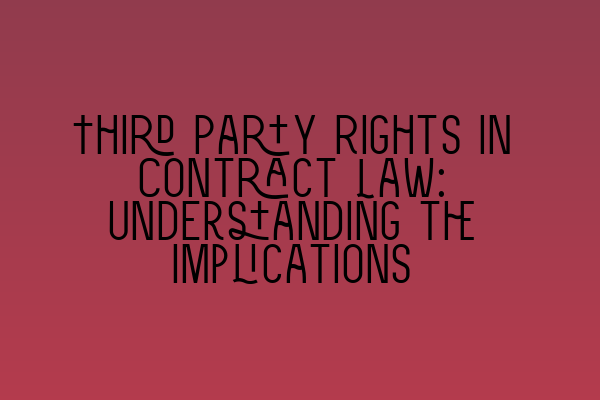Third Party Rights in Contract Law: Understanding the Implications
Contract law is a fundamental area of legal practice that governs the relationships between parties involved in a wide range of transactions and agreements. While contracts primarily exist to protect the rights and obligations of the contracting parties, it is crucial to consider the potential impact on third parties. Understanding these implications is essential to avoid legal disputes and ensure fair treatment for all involved parties.
In this comprehensive guide, we will explore the concept of third party rights in contract law, discuss their implications, and highlight the importance of addressing these rights when drafting and interpreting contracts.
What are Third Party Rights?
Third party rights refer to the rights held by individuals or entities who are not original parties to a contract but may be affected by its terms and conditions. While contracts typically bind only the contracting parties, third parties may have an interest or reliance on the contract that gives rise to certain rights or imposes certain obligations.
Third party rights can arise in various situations, such as:
- Beneficiary rights under a trust agreement
- Assignment of rights or delegation of obligations
- Collateral warranties
- Statutory protections
Implications of Third Party Rights
The consequences of third party rights can be significant and should never be overlooked. Failing to consider these rights can lead to unforeseen legal disputes, financial loss, and damage to your professional reputation.
1. Legal Challenges: Third parties with rights under a contract, such as beneficiaries of a trust, can enforce those rights in court if the contracting parties fail to fulfill their obligations. This can lead to expensive litigation and potential damages or other remedies being awarded against you.
2. Contractual Interpretation: The presence of third party rights can influence the interpretation of contract terms. Courts may interpret ambiguous clauses in favor of protecting third party interests, particularly if the contract was intended to confer a benefit on third parties.
3. Liability and Indemnity: Depending on the nature of the contract, third parties may have claims for damages or indemnification in the event of a breach. For example, a construction contract may include collateral warranties that allow third parties, such as subsequent property owners, to bring claims against the original contractor if defects arise.
4. International Transactions: In cross-border contracts, the consideration of third party rights becomes even more crucial due to potential conflicts of laws. Understanding the rights and obligations of third parties in different jurisdictions is essential to ensure compliance and to mitigate legal risks.
Addressing Third Party Rights in Contracts
To prevent potential legal challenges, it is vital to address third party rights explicitly in your contracts. Here are some practical considerations:
1. Identify Potential Third Party Interests: Before drafting a contract, conduct a thorough review to identify any potential third parties who may have an interest in the contract, whether directly or indirectly. This could include beneficiaries, assignees, or other entities affected by the contract.
2. Clarity in Contract Language: Clearly define the rights and obligations of the contracting parties and any relevant third parties. Use precise language and avoid ambiguity to minimize the risk of differing interpretations.
3. Include Appropriate Clauses: Depending on the situation, consider including specific clauses relating to third party rights, such as assignment and delegation provisions, warranties, or provisions addressing statutory protections for third parties.
4. Seek Professional Advice: For complex agreements or international transactions, it is advisable to seek legal advice from an experienced contract lawyer or solicitor who specializes in the relevant area of law. They can help identify potential third party rights and ensure that your contract adequately addresses these issues.
Conclusion
Understanding the implications of third party rights in contract law is crucial for anyone involved in drafting, negotiating, or enforcing contracts. Considering third party rights not only promotes fairness and transparency in contractual relationships but also protects your interests and minimizes the risk of costly legal disputes.
By acknowledging the potential impact of third party rights, being proactive in addressing them in contract drafting, and seeking legal advice where necessary, you can navigate the complexities of contract law with confidence and ensure the smooth execution of your agreements.
For more information on other legal topics, practice exams, and preparation courses for the SQE, visit our related articles:
